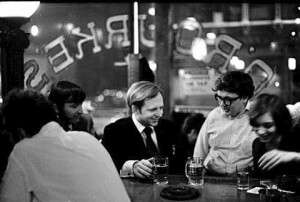On Monday, most of the staff of Time Out Chicago was laid off as the magazine began the transition to an all-digital model.
Last night, I noticed Laura Baginski, former features editor of Time Out Chicago, had “Editor of Time Out Chicago” in her Twitter bio so I tweeted it out. A few minutes later, former TOC editor-in-chief Frank Sennett confirmed that fact and the names of the 10 other people who are still employed there.
So with apologies for the Buzzfeed-like title, here are the 11 people who still work at Time Out Chicago and the titles they had under the previous ownership (many, like Laura, probably have new titles but perform similar functions).
Laura Baginski – Features Editor
Kris Vire – Theater Editor
Brent Dicrescenzo – Managing Editor
Jake Malooley – Reporter/Front of book/Chicago Tracker
Julia Kramer – Associate Dining Editor
Laura Pearson – Books & Poetry Editor
Martha Williams – Associate Photo Editor
Jessica Johnson – Senior Online Producer
Erin Delahanty – Digital Marketing Manager
Robert Ruthardt – Senior Account Manager
Marla Tarantino – Accounting Specialist
For those keeping score, that’s six editors, one digital staffer, a photojournalist, two for marketing and sales and an accountant. Having worked with many of those folks and counting more than a few as friends, I can tell you that’s a damn fine roster and some are my favorite Chicago writers.
A few other thoughts in the wake of the departure of Time Out Chicago‘s print edition:
There’s been a stunning lack of reporting about TOC in the days since it was announced it was going all-digital. Even in the last couple of days, there’s been little aside from what’s been announced by the brand itself or via Twitter. So it was probably no surprise that the biggest news – the above and media critic Robert Feder’s departure – was released via Twitter by people who used to work there. But I guess that’s what happens when the city’s only full-time media critic is one of the people laid off.
Incidentally, if you’re an all-digital publication I’m not sure why you’d buy out the contract of the biggest driver of your Web traffic. Sure, most of Feder’s readers probably came for him and didn’t cross over into other TOC content but if you want eyes and impressions why not retain him through a transition while you rebuild the likely traffic decline from not having a print publication as a driver of awareness for the site?
In short, money. A print magazine that broke its all-time ad sales revenue record in July 2012 was probably still a viable product so the only reason you’d shut it down would be to run the brand as cheaply as possible until you sell it as a package in a few years with the other brands in the portfolio and not because you think the print product can’t make money (which is another way of saying “don’t think a second news/entertainment glossy print product can’t make a go of it in Chicago”). Don’t just take my word for it: the Time Out CEO all but admits this is the plan in the last graf of this piece by Lewis Lazare.
As for the other locally-based, editorially-driven, news/entertainment print concerns in Chicago: Tribune’s Chicago magazine and Red Eye are obviously still doing well; according to Mike Miner, the Chicago Reader‘s readership numbers have been on a three-year climb (though the number you really want to look at is the press run which has remained steady) and I wouldn’t be surprised to see Wrapports’s The Grid and Splash break out of the Sun-Times wrapper sometime soon. Hell, even New City is still kicking around. And the above doesn’t even take into account Michigan Avenue and Chicago Social, both glossy magazines though they occupy a much different space in the market. Or Crain’s Chicago Business.
All of which says those who see TOC‘s print demise as a harbinger aren’t looking at the full picture.
Disclosure: I worked at TOC from 2007-2009 and am friends with many of the people who used to work there and some who still do. All of the above is based on public knowledge or is solely my conjecture or opinion.
